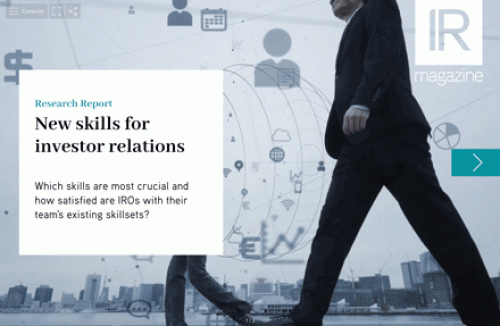Top US IROs reveal what they wanted to be at school
Nobody wants to be an IRO when they’re at school, according to a poll of the top IROs in the USA conducted by XbInsight on the eve of the IR Magazine US IR Awards 2011. The finding is perhaps the least surprising to come out of a study of the winners and runners-up in the best IRO award over the last five years. As one IRO explains: ‘I didn't even know what an IRO was when I was in school. I wanted to be an accountant.’
Some of you might find it interesting that accountancy was the single most popular career choice of top IROs when they were at school; others will undoubtedly groan. But none should be too worried for the state of the profession. The childhood aspirations of the leading lights in the industry were suitably high, varied and idealistic: TV anchorman, archeologist, foreign service officer and starting guard for the NBA battled it out with the more traditional careers in law, medicine, engineering and, er, market research.
Multiple IROs said they wanted to be a CFO, but only one IRO wanted to be a ‘responsible [and] compassionate human being’. It should be clarified that none of the IROs was asked whether they had gone on to achieve their early goals.
When the report is published next month it should give IR practitioners an insight into what it takes to be at the top of the industry. On a serious note, the report looks at the education, professional qualifications and experience of the top IROs in the USA. It also asks them to opine on the changing nature of the profession, the best and worst aspects of the job, the changing requirements of the role and the measure of an IRO’s performance, among other things.
We also asked the current and former IROs where they want to be in five years’ time. The most popular answer from respondents – who include 85 percent of the IROs who are up for the award at the upcoming event at the Cipriani Wall Street in New York on Thursday, March 24 – was retired. A few even went into detail, sketching out retirement plans that range from sailing Long Island Sound to teaching at a local university. ‘On a sunny beach or a wintery ski slope; it doesn't much matter,’ said one large-cap IRO.
But life in IR can’t be too bad. In a positive sign for the profession, which demonstrates the potentially ambition-altering effects of a long and fulfilling career in investor relations, one IRO of a mid-cap company hoped to be in the same role in five years time, albeit reporting on an improved economy. Moreover, when we asked the same IRO what he wanted to be in school, he said ‘retired’.
Another IRO approaching retirement age said he would only leave his position in IR if and when he is forced to hang up his reports and park his earnings guidance.
As we look forward to the awards on Thursday evening, IROs without a nomination in this year’s event should remember that it takes an average of 10 years in investor relations to be shortlisted for the best IRO award. The longest time it took was 25 years. The shortest was one year – Jim Burns from Hewlett Packard.
IR magazine wishes all nominees the best of luck at the event on March 24.










